Horses sleep lying down. Tonk’s stall is clean when he goes in at night, but, horses poop, and Tonka always seems to find a pile of manure for a pillow for his (white!) quarters. During the day, he has a favorite sandy spot in the paddock to roll in.
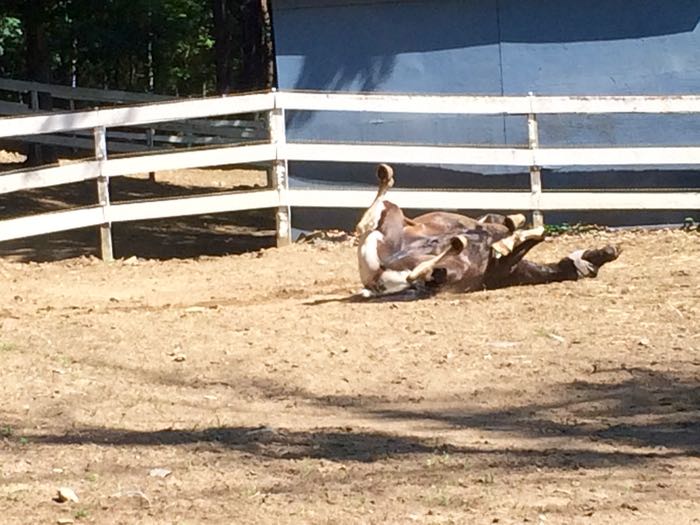
Some horses are one-side rollers, but Tonka rolls on both.
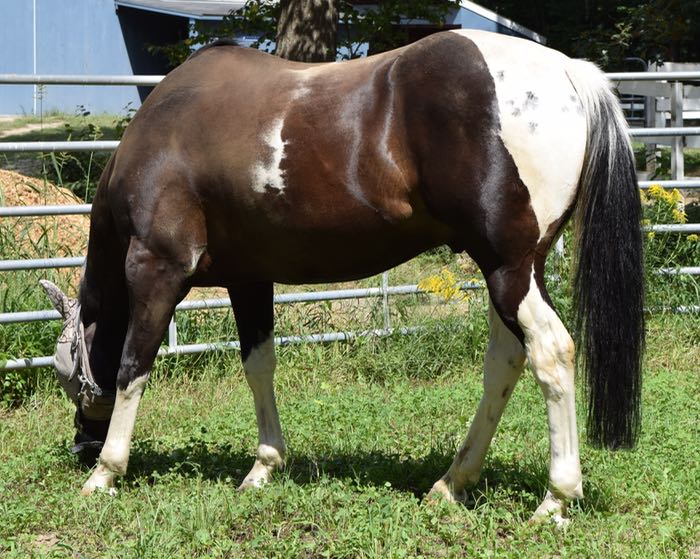
Like all of us, horses have dead skin and dandruff, and being fur-bearing animals, they shed. These are all reasons enough to give your horse a grooming everyday. But, getting your horse clean is not the most important reason to get out the brushes. I spend hours a week grooming my horse because this is a way to bond with him.
Horses are herd animals, who (when managed properly with space, resources, forage, etc.) get along in a companionable manner, mostly walking around and eating, and at times dozing in the sun. Within that group there are tight friendships – usually bonded pairs. Those horses stand tail to head, swishing flies for each other; sometimes they scratch each other’s withers with their teeth. Touch and mutual grooming are essential to horse friendship.
In a boarding situation, you try to put friends together, but it’s not always possible. Tonka spends the day in a paddock with Maggie. They get along okay – there’s no drama, but they’re not best friends. You can’t force friendship. My horse doesn’t have another horse to scratch his withers, but he has me. Lucky for him, I love grooming. I learned my technique at a riding school in England, where there were daily inspections. No teatime if there was a rough spot on your horse! A thorough grooming takes time – which I think is a wonderful excuse to get in tune with a horse.
Most grooming sessions start with a curry comb. This one is flexible rubber.
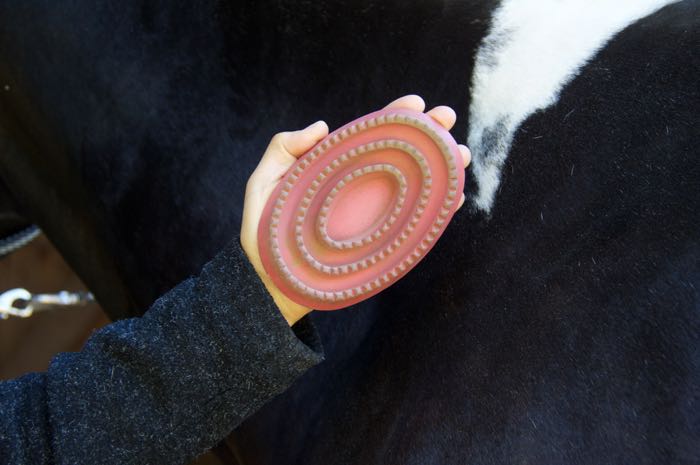
When I first got Tonka, he pinned his ears and fidgeted when I groomed him. As always, my mantra is to pay attention. The horse will tell you what he likes and what he doesn’t. Your horse will know if you are listening to him. Horses communicate to each other with superbly subtle body language – a flick of an ear, a shift of weight – all has meaning. How frustrating it must be to horses to have to interact with us dull humans who don’t listen! Responding to your horse’s body language while grooming him is the first and most basic step to gaining trust and it will carry over to when you are on his back. Something as simple as changing how you brush him because of what he tells you reaps rewards far beyond having a horse politely stand still. So, I respected what Tonka had to say and I put away the curry. Instead I got a sisal grooming mitt. (The one I have is an inexpensive model, but you could splurge and get this one.)
As you can see, it does a great job of loosening dirt and hair.
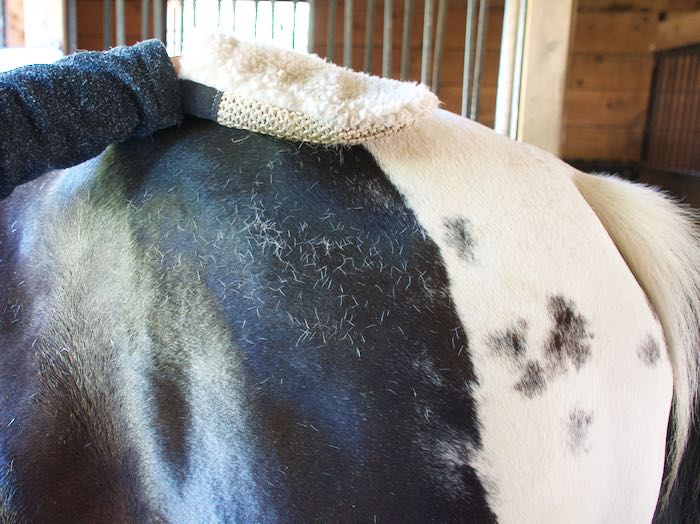
Tonka particularly likes having me use it on the insides of his legs where he can’t reach. How do I know? He politely shifts his bum and leans in.
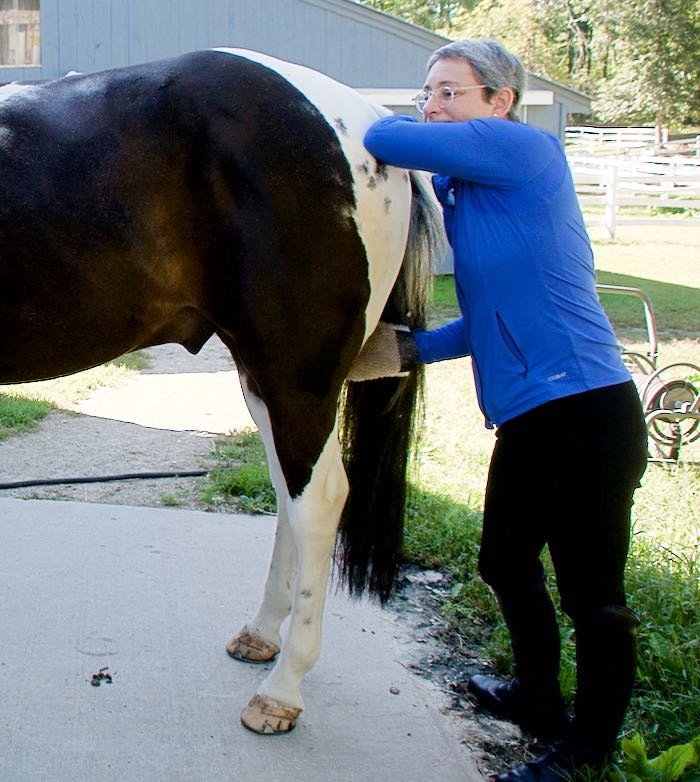
Here is Tonka, tipping his head so that I can scritch his ears and poll with the mitt.
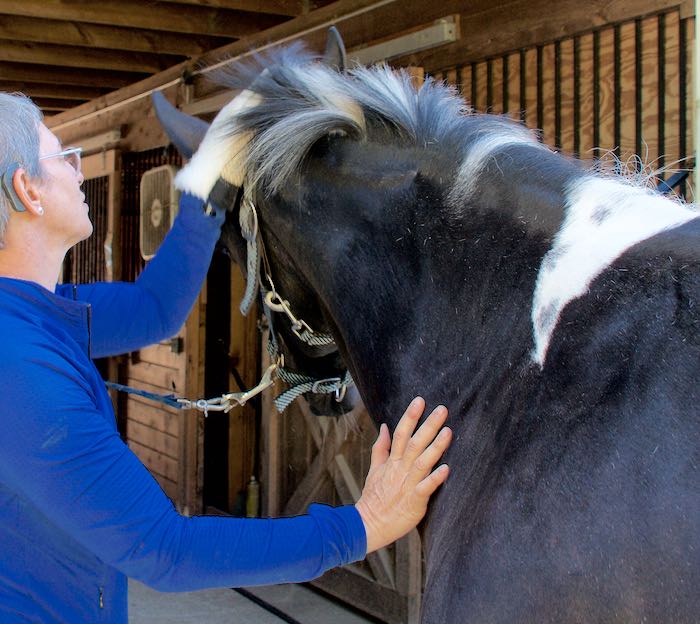
This is a happy horse.
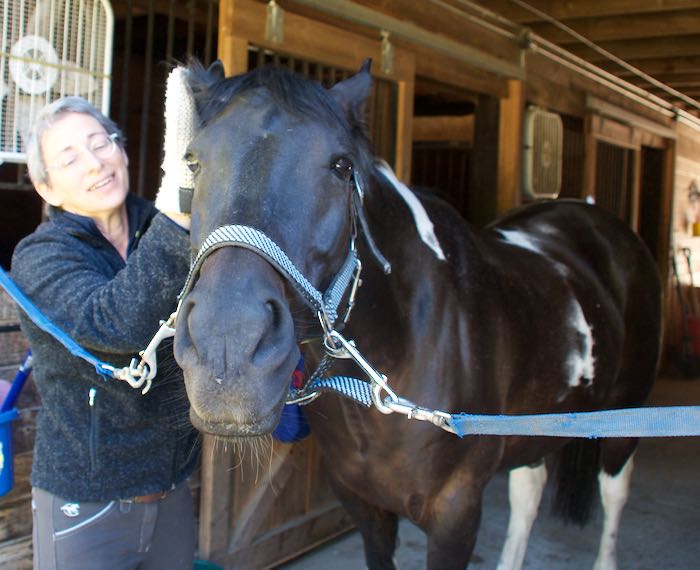
Next, I use a dandy brush to flick the loosened hair and dirt off of him.
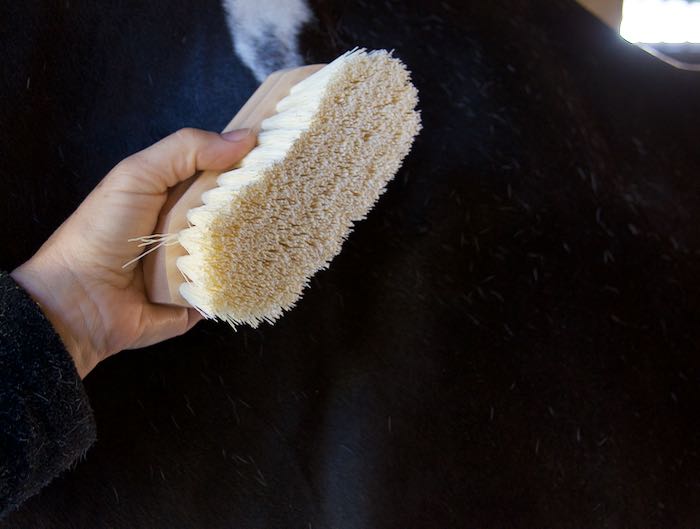
As I groom, my free hand is as important as the one holding the brush. It feels for rough spots, lumps and anything else that I might not see.

The body brush comes next. This gets the fine dirt off, and brings up oils and creates shine. I love seeing a gleaming coat.
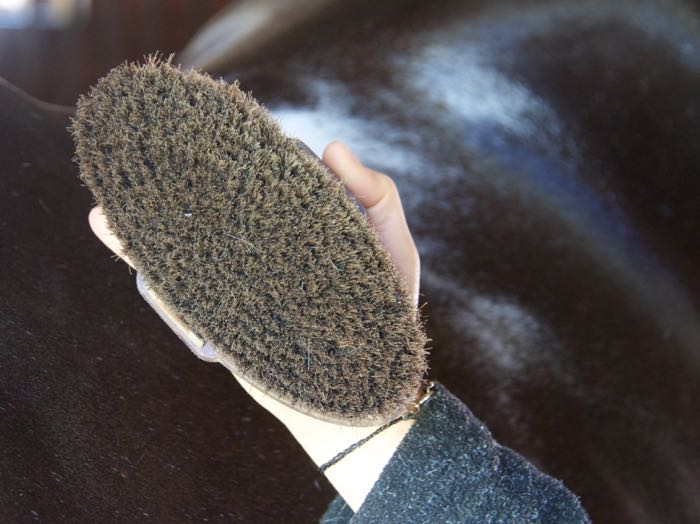
I do have a use for that curry – I use it to keep the brushes clean.
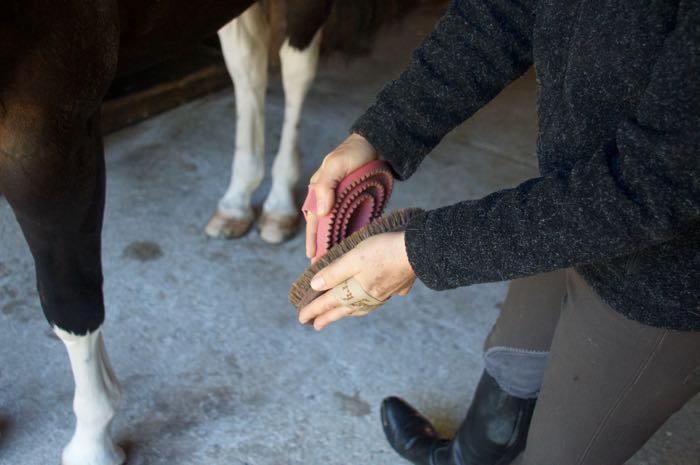
At this point, some people stop brushing. I don’t. I pull out a finish brush. When I first got Tonka, before I even touched a brush to his face, he let me know that he didn’t like it. He’d swing his head away from me when I held a brush at the height of his head. So, I got a smaller, super-soft brush. I used clicker training to teach him to touch his head to the brush (I didn’t reach to him, he came to me.) When I finally brushed his face I could see him realize, this feels GOOD. Now I use this brush on his entire body. (I don’t use the clicker for grooming anymore – it was for that specific situation that needed to be changed. I like grooming to be peaceful and undemanding. Tonka can relax and not worry about doing a behavior for a reward.)
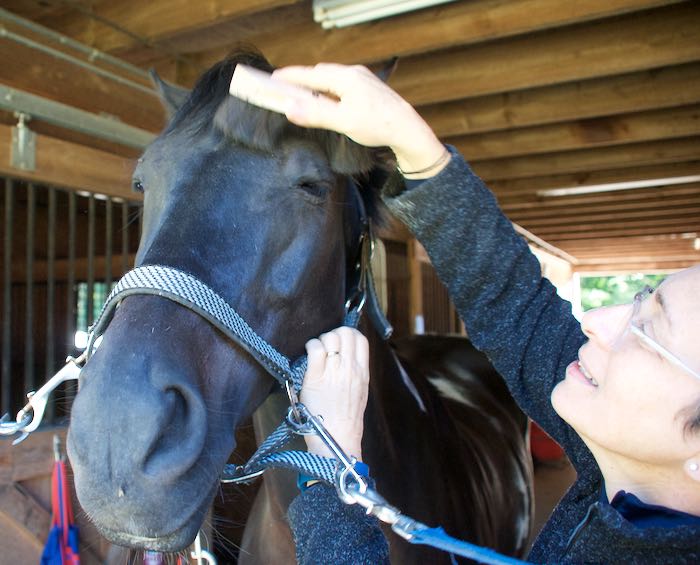
If I have the time, I go over him with a sheepskin mitt. That gets the last bit of dust and dander off, and he likes it. (By the way, I’m not holding him down by the halter, I’m moving it out of the way to get his whole face.)
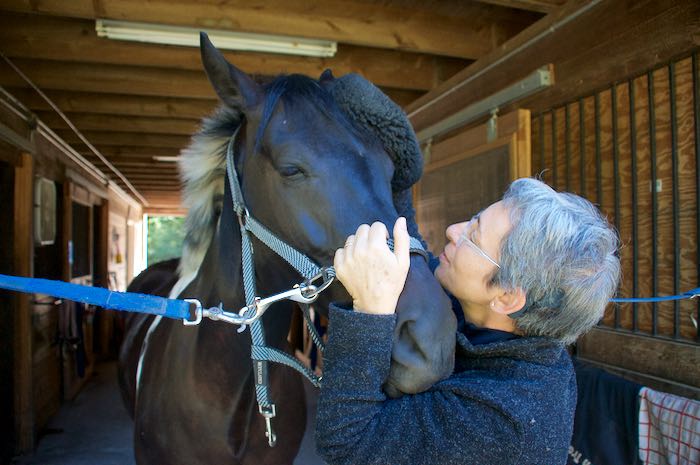
We’re still not done. There are shavings in his tail to comb out and knots to untangle. I start from the bottom and use a
Auto Amazon Links: No products found.
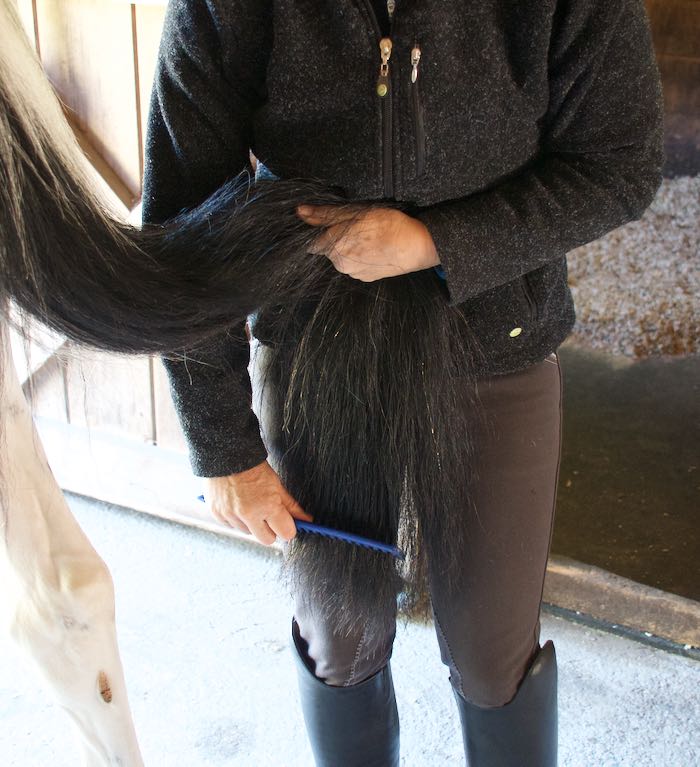
Then, I pick out his hooves.
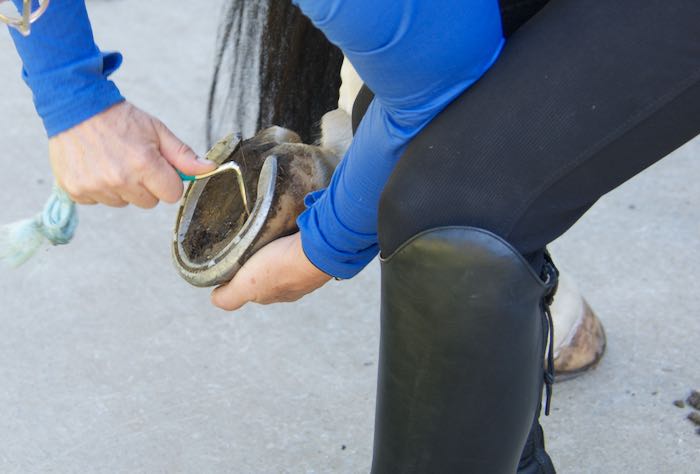
Lastly, I sweep up.
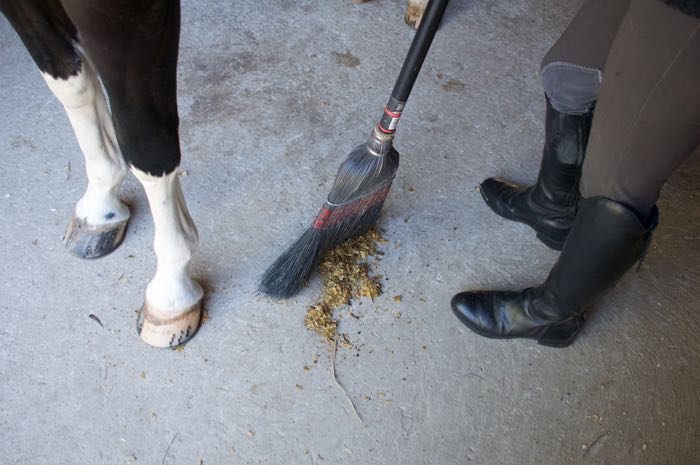
All of that work is worth it.
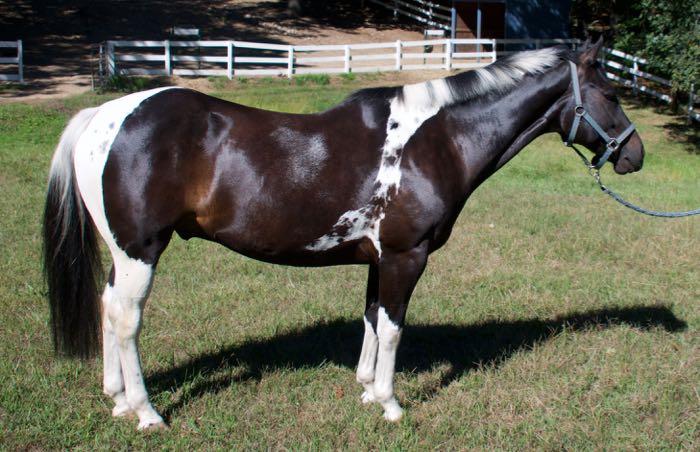
And it makes us both happy.
I teach others how to groom their horses so that it is a mutually beneficial time for both horse and rider. Here’s a quote from one of my clients:
Ever since I switched to your style of grooming Salti has stopped stepping away. In fact he leans into the cactus cloth on his neck.
Salti was a horse that I had dubbed “Mr. Grumpypants” because of his ear pinning and general annoyed expression. It turns out that Salti is a both a sensitive soul and a horse with very sensitive skin. With a few adjustments in care, he’s become affectionate and more outgoing.
I’m willing to travel. If you want to learn how to have a dialog with your horse while grooming, email me. I’ll listen to both of you.
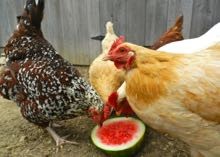
I love the sheepskin mitt picture–that’s one happy horse.
He is :)
beautiful
Thank you!
Awww, he looks so happy!
Both of us!
Hi, Tonka seems to be one happy fellow!! I have a question, I’ve been wondering for a while. Why is his mane cut so short?? Wondering because we never cut a mane that was grown out. We did “roach” the working horses sometimes.
Just wondering :-)
The short mane is an English style. I like it :) Tidy, and shows off his lovely neck. It’s not actually cut (which would look awful), but rather I use a technique that breaks the hairs. (Some people pull it out by the roots, I don’t do that.)
Terry, thank you for the link to Karen Pryor’s book. I devoured it, and ordered another. I had no idea just how many animals, and people, can benefit from clicker training! I cannot wait to get started on some dogs and horses that I sit for!!
Karen Pryor changed my world – that was 20 years ago – and she continues to make a difference for animals and people. So pleased that you found her. Just a caveat – I wouldn’t start actually clicking with horses just yet. They’re a difficult species to train with the clicker without also creating issues. But, do use the perspective of looking for the behaviors you want, and making those actions rewarding to the animal. I’ll be writing more blogs about this!
That’s what you call a shine.!! Jess spends hours grooming the 3 horses she is looking after, she uses a mitt and brushes the same as you do. Where its been so wet and muddy they get really gunky, but they love being done. She calls them in from the field and lets them choose who’s done first, the others wait there turn politely. Lovely to see the before and after results..:)
Horse’s do NOT sleep lying down unless they are sick.
I’m glad that you posted. It’s a misconception that horses don’t sleep lying down. Just like us, they need REM sleep, and they do that best when lying down. However, horses want a comfy and soft place, so if the facility only has rocky ground, if the stall is dank, or if the horse doesn’t feel safe and so only catnaps, then the horse will not lie down. Give a horse a clean, deeply bedded stall, or a pasture with grass – or even a nice sandy spot – and the horse will happily sleep sprawled out. I know that Tonka has had a good night’s rest when I have a lot of shavings to pick out of his tail :)
For many summers, I taught riding and basic stable and horse management. And that included grooming and tack care, among other topics. Every week we had an in-action ‘quiz’ and every month a Horse Mastery ‘test’. I used to give special points to those kids who could get their horses to lean into their grooming tool, or –the best– actually cause them to groan when they got the touch just right. It taught them to calibrate the tool, vigor and pressure they used to be just right, as evidenced by the horse actively wanting more, or leaning in. Demerits were given for those who ‘dropped’ a hoof, rather than carefully placing it on the ground after picking, or who pulled a mane so much the horse shook his head, forgot to wipe out the inside of ears or nostrils, etc. Most of these horse crazy kids loved these lessons and the quizzes and ‘tests’ as much as the riding lessons. One of the many ‘tests’ was to “groom a horse to perfection”, which included evaluating how much the horse enjoyed the process as well as a very formal, point by point final inspection by me, with a line of big eyed, giggling little girls and boys nervously awaiting the results. A sure winner was once dethroned because she inadvertently hung on the lead shank and halter too often when leading her horse, pulling the horse’s head down unnecessarily. The strictness came with a wink and a smile (and sometimes a put on exaggerated British accent), but the points were real and all about teaching respect and kindness toward these magnificent animals as well as the specific skills. I started most kids on a black Shetland pony named Boo Boo that so loved being groomed –any time, anywhere, and allll day if possible– he would close his eyes, groan, pick up each hoof in sequence before anyone touched the leg, and twitch his tail only when you stopped brushing him. He loved warm water baths so much that he would pull to go into the wash stall, turn himself around and back into position unaided. Parents who wanted to find riding instruction that included only in saddle work were encouraged to find another instructor. Ain’t horses grand?
Brilliant! Lucky students – and those paying attention skills go far beyond the horse world. Now to do this for the adult beginner horse owners who no one thinks to teach this to, and then are crushed that their horses don’t seem to like them.
Tonka looks so happy, and so beautiful, like he’s been varnished!
Why don’t horses get fleas?
Good question! Fleas need animals that have nests and beds, like mice. Fleas also prefer a different type of fur to hide in. Once in awhile, the conditions can be right for fleas on horses – but then a lot else is wrong, too.
Terry, Jess uses a barrier oil on the horses hooves because its been so wet. Do you ever use a oil ??
I’m not sure what barrier oil is, but I avoid anything that seals the hooves. I do use hoof conditioner when the walls get dry.
Its not a sealant, probably a type of conditioner, helps prevent the water penetrating the hooves too much, a bit like hand cream.
Wonderful pics, you both look very content, lovely relationship and it shows, you must be very proud..:)
Just the most amazing markings on that horse!
I never get tired of looking at him.